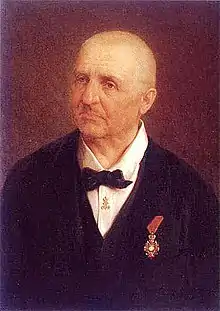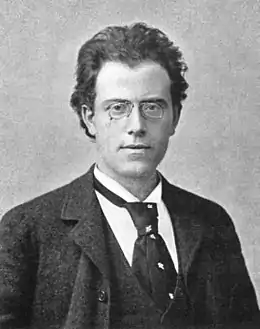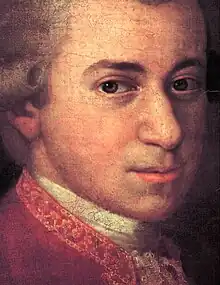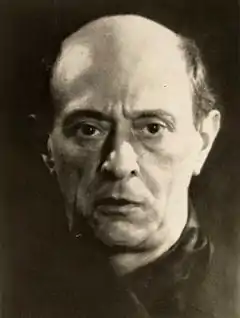This is an alphabetical list of Austrian composers.
The portraits at right are seven of the most-prominent Austrian composers, as agreed by three published reviews.[1][2][3]
A – M
- Johann Georg Albrechtsberger (1736–1809) – Classical-era composer of preludes, fugues and sonatas for the piano
- Elkan Bauer (1852–1942) – 20th-century composer; wrote popular waltzes
- Alban Berg (1885–1935) – 20th-century composer; member of the Second Viennese School
- Anton Bruckner (1824–1896) – composer of nine large-scale symphonies, sacred works and organ works; church organist
- Antonio Casimir Cartellieri (1772–1807)
- Franz Clement (1780–1842), full name Franz Joseph Clement
- Carl Czerny (1791–1857) – composer; student of Ludwig van Beethoven; known for his piano exercises and pedagogy
- Anton Diabelli (1781–1858), also Antonio
- Carl Ditters von Dittersdorf (1739–1799) – Classical-era composer and violinist
- Nico Dostal (1895–1981) – composer, arranger, Kapellmeister
- Anton Eberl (1765–1807)
- Joseph Leopold Eybler (1765–1846)
- Robert Fuchs (1847–1927)
- Johann Fux (1660–1741) – composer, influential theorist on Renaissance counterpoint
- Heinz Karl Gruber (born 1943) – composer, bassist and singer
- Siegmund von Hausegger (1872–1948)
- Georg Friedrich Haas (born 1953) – composer of contemporary classical music
- Joseph Haydn (1732–1809) – Classical-era composer; composed 104 symphonies, as well as numerous string quartets and other chamber music, operas and sacred works
- Michael Haydn (1737–1806) – Classical-era composer; younger brother of Joseph Haydn
- Leopold Hoffman (1738–1793) – Classical-era composer
- Johann Nepomuk Hummel (1778–1837) – composer and pianist; music bridged the Classical and Romantic periods
- Erich Kleiber (1890–1956)
- Fritz Kreisler (1875–1962) – 20th-century violinist and composer
- Nikolaus von Krufft (1779–1818) – Classical composer of piano music and lieder
- Josef Labor (1842–1924)
- August Lanner (1835–1855), born Augustin Lanner
- Joseph Franz Karl Lanner (1801–1843) – early-Romantic-era dance-music composer; one-time colleague of Johann Strauss I
- Bruno Liberda (born 1953) – composer; student of Roman Haubenstock-Ramati; contemporary classical music; first electronic music ever to be performed in the Vienna State Opera
- Franz Liszt (1811–1886) Hungarian composer, born in the Kingdom of Hungary, Austrian Empire
- Gustav Mahler (1860–1911) – late-Romantic composer of large-scale and sometimes programmatic symphonies; born in Bohemia in a German-speaking community, a subject of the Habsburg Empire; music director in Vienna in the 1890s and 1900s
- Marianna Martines (1744–1812) – composer, singer and pianist
- Alois Melichar (1896–1976) – composer, arranger and conductor
- Jacques de Menasce (1905–1960) – became an American in 1941
- Franz Xaver Wolfgang Mozart (1791–1844) – son of Wolfgang Amadeus Mozart
- Leopold Mozart (1719–1787) – Classical-era composer, violinist, author of influential treatise on playing the violin
- Wolfgang Amadeus Mozart (1756–1791) – Classical-era composer of operas, piano concertos, chamber music, symphonies and sacred works; son of Leopold Mozart
N – Z
- Sigismund von Neukomm (1778–1858) – born Sigismond Neukomm, after ennoblement as a knight Sigismund Ritter von Neukomm
- Karl von Ordóñez (1734–1786) – also Carlo or Carl d'Ordonetz, Ordonnetz, d'Ordóñez, d'Ordonez, Ordoniz
- Kurt Overhoff (1902–1986) – composer and conductor
- Leonhard Päminger (1495–1567) – also Paminger and Panninger
- Maria Theresa von Paradis (1759–1824) – Classical-era composer; inspiration for the Piano Concerto No. 18 in B-flat major by Wolfgang Amadeus Mozart
- Johann Baptist Peyer (c.1678–1733) – organist and composer
- Walter Rabl (1873–1940) – Viennese composer, conductor and teacher of vocal music
- Carl Georg Reutter (1708–1772) – Baroque-era court composer
- Emil von Reznicek (1860–1945) – born Emil Nikolaus Joseph, Freiherr von Reznicek
- Franz Xaver Richter (1709–1789) – Czech František, French François Xavier
- Johann Heinrich Schmelzer (1623–1680) – composer and violinist; first German-speaking composer to publish solo violin and b.c. sonatas in the Italian style (Sonatae unarum fidium seu a violino solo, 1664)
- Franz Schmidt (1874–1939) – 20th-century composer of symphonies and operas, cellist and pianist
- Arnold Schoenberg (1874–1951) – 20th-century modernist composer; founder of the Second Viennese School; developer of the twelve-tone technique
- Franz Schubert (1797–1828) – Classical-/Romantic-era composer; regarded as the first significant lieder writer; composer of many instrumental works as well
- Robert Stolz (1880–1975) – conductor and composer of operettas, film music and songs
- Eduard Strauss (1835–1916) – dance-music composer; brother of Johann Strauss II
- Johann Strauss I (1804–1849) – early-Romantic-era dance-music composer
- Johann Strauss II (1825–1899) – Romantic-era composer of waltzes and polkas, wrote The Blue Danube waltz
- Josef Strauss (1827–1870) – dance-music composer; brother of Johann Strauss II
- Franz von Suppé (1819–1895) – composer of light opera
- Franz Xaver Süssmayr (1766–1803) – Classical-era composer; student of Wolfgang Amadeus Mozart
- Sigismond Thalberg (1812–1871)
- Joseph Umstatt (1711–1762)
- Johann Joseph Vilsmayr (1663–1722)
- Georg Christoph Wagenseil (1715–1777) – Classical-era composer, harpsichordist, and organist
- Anton Webern (1883–1945) – 20th-century composer, member of the Second Viennese School; used the twelve-tone technique in addition to the style known as serialism
- Egon Joseph Wellesz (1885–1974) – 20th-century composer, teacher, musicologist; pupil of Arnold Schoenberg and student of Byzantine music
- Erich Zeisl (1905–1959) – Modernist Jewish Viennese composer of symphonies, ballets, choral music, operas, and film scores; fled Nazis for America in 1938
- Karl Michael Ziehrer (1843–1922), also spelled as Carl
References
- ↑ Moldafsky, Annie (10 February 1985). "Savoring Vienna: Music is everywhere". The Milwaukee Journal.
- ↑ Intercultural Outreach CultureGuides: Austria (PDF). Brigham Young University. 2006.
- ↑ Mariani, John (12 January 2015). "Vienna Is One of the Most Civilized Cities in Europe". HuffPost.
See also
This article is issued from Wikipedia. The text is licensed under Creative Commons - Attribution - Sharealike. Additional terms may apply for the media files.







